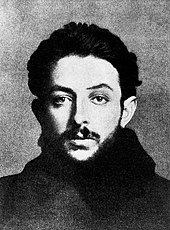Eugene Leviné
Eugen Leviné (* 10. May 1883 in St. Petersburg , † 5. June 1919 in Munich ) was a revolutionary and KPD - politicians . As such, he had a formative influence on the second phase of the Munich Soviet Republic in April 1919.
resume
Eugen Leviné was born in St. Petersburg in 1883 as the son of a Jewish merchant family. After the father's early death, his mother and her three-year-old son moved to the German Reich . The family lived in Wiesbaden and Mannheim .
During his law studies from 1903 in Heidelberg and 1904/05 in Berlin Leviné came into contact with left-wing Russian emigrants. In September 1905 he returned to Russia for revolutionary agitation . As a participant in the Russian Revolution of 1905 , he was arrested there in 1906 and again in 1908 and badly mistreated.
In 1908 Leviné was ransomed by his mother and was able to return to Germany in 1909. He studied economics and a doctorate in Heidelberg with a thesis on types and stages in the development of unionized workers to Dr. phil. In 1909 he became a member of the SPD , and in 1913 a citizen of Baden . He married Rosa Broido (1890–1979), who was also born in Russia, in Heidelberg in 1915 and thus saved her from the “protective custody” into which she had been taken as a Russian citizen after the war began. Their son was born in 1916.
During the First World War Leviné worked as an interpreter in a prisoner of war camp and was then drafted into the army, but released again in 1916 for medical reasons. He joined the USPD and was one of the founders of the Spartacus League . In the autumn of 1918 Leviné traveled as a speaker through the Ruhr area and was delegated to the Imperial Council Congress by Essen workers . He also took part in the founding party convention of the KPD, where he spoke out against participating in the National Assembly . At the beginning of 1919 he was one of the leading personnel of the party.
Revolution in Munich
Leviné was sent to Munich from the KPD headquarters in Berlin in mid-March 1919 . There, after the murder of Prime Minister Kurt Eisner, the mood had radicalized and a Soviet republic was imminent. Leviné should take over the leadership of the Munich KPD and the editing of the party newspaper Münchner Rote Fahne .
In April 1919 Leviné became the leader of the second communist Munich Soviet republic after the Palm Sunday coup, which was foiled by the Red Guards and directed against the council government . After the bloody suppression of the revolution in Munich on May 2, he initially went into hiding, but was arrested on May 13 and put on trial in Munich at the beginning of June. The well-known sentence comes from his defense speech in court: “We Communists are all dead on vacation.” On June 3, 1919, he was sentenced to death for high treason and shot in the Stadelheim prison the following day .
literature
- Christian Dietrich: Eugen Leviné: "I feel Russian and think Jewish". Edited by Hermann Simon. Hentrich & Hentrich, Berlin 2017, ISBN 978-3-95565-232-6 .
- Paul Frölich : Eugen Leviné. Association of International Publishing Institutions, Berlin 1922.
- Rosa Meyer-Leviné : Leviné. Life and death of a revolutionary. Memories. Hanser, Munich 1972, ISBN 3-446-11624-9 .
- Leviné, Eugene. In: Hermann Weber , Andreas Herbst : German Communists. Biographical Handbook 1918 to 1945 . 2nd, revised and greatly expanded edition. Karl Dietz, Berlin 2008, ISBN 978-3-320-02130-6 .
- Hermann Weber: Leviné, Eugen. In: New German Biography (NDB). Volume 14, Duncker & Humblot, Berlin 1985, ISBN 3-428-00195-8 , p. 400 f. ( Digitized version ).
Web links
- Literature by and about Eugen Leviné in the catalog of the German National Library
- Nick Brauns : “World Revolution!” Eugen Leviné was executed 85 years ago. In: young world . June 5, 2004 (reproduced on raeterepublik.de).
Individual evidence
- ↑ Christian Dietrich: Eugen Leviné: "I feel Russian and think Jewish" . S. 46-51 .
- ↑ Complete quote from: Nick Brauns: “World Revolution!” Eugen Leviné was executed 85 years ago. In: young world . June 5, 2004, accessed on April 13, 2019 (reproduced on raeterepublik.de): “We communists are all dead on vacation, I am aware of that. I don't know whether you will extend my leave of absence or whether I will have to join Karl Liebknecht and Rosa Luxemburg "
| personal data | |
|---|---|
| SURNAME | Leviné, Eugene |
| BRIEF DESCRIPTION | Revolutionary and Politician (KPD) |
| DATE OF BIRTH | May 10, 1883 |
| PLACE OF BIRTH | St. Petersburg |
| DATE OF DEATH | June 5, 1919 |
| Place of death | Munich |
